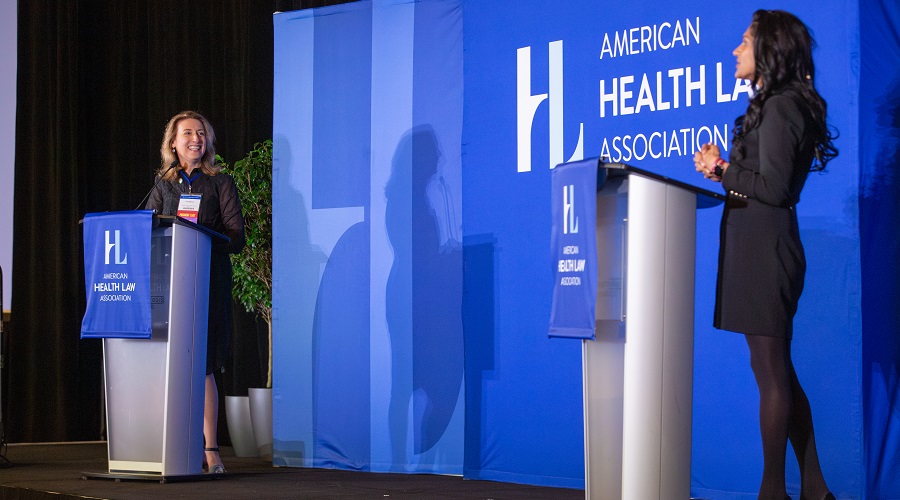Highlights from AHLA’s 2023 Annual Meeting
- June 30, 2023

AHLA’s 2023 Annual Meeting took place this week in San Francisco, CA, bringing together nearly 900 health law professionals in a dynamic and collegial environment to learn about all the new and important developments in health law. Topics discussed at the meeting included mental health parity, non-compete agreements, false claims act litigation, legal ethics, tax issues for health care organizations, telehealth, transactions, and much more. Below are some highlights:
- Keynote Examines the State of Mental Health. Overcoming stigma is the number one barrier to improving mental health care, AHLA’s keynote speaker for its 2023 Annual Meeting, Dr. Nina Vasan—a psychiatrist and professor at Stanford, and founder and Executive Director of Brainstorm: The Stanford Lab for Mental Health and Innovation—told meeting attendees June 26. Although we have seen a transformation of mental health during COVID that marked a sharp decline in stigma, we still have a long way to go, Vasan said. Often the need for care is identified too late. The average amount of time between a person feeling symptoms of a mental health condition and seeking treatment is 11 years, she noted. Another barrier is lack of access. “Parity is nowhere near where it should be,” Vasan said, highlighting that insurance coverage also doesn’t match the way mental illness presents itself. Although there is decent coverage of both ends of the mental illness spectrum—very sick patients who need hospitalization and patients who visit a therapist on an outpatient basis—there isn’t enough attention paid to the middle of the spectrum, according to Vasan. Vasan also called on health lawyers to help push for policy changes that she believes could vastly improve mental health care—telehealth reimbursement, easing HIPAA restrictions, and dissolving state boundaries.
- Government Representatives Discuss Just-Issued Information Blocking Final Rule. Minutes after the Department of Health and Human Services Office of Inspector General (OIG) issued its long-awaited final rule on information blocking, OIG representatives gave attendees the first scoop on the rule. The session had four government speakers: Elise Sweeney Anthony, Executive Director, Office of Policy, Office of the National Coordinator for Health IT (ONC); Cassie R. Weaver, Policy Analyst, Office of Policy, ONC; James F. Hansen, Senior Counsel, Affirmative Litigation Branch, OIG; and Scott P. Stiefel, Senior Counsel, Affirmative Litigation Branch, OIG. Stiefel gave the audience several illustrative violation examples to show how the final rule would work in practice. He also explained how OIG will determine the amount of CMPs under the rule. Stiefel noted that such factors as: the nature and circumstances of the violation; the degree of culpability; whether the conduct was self-disclosed; history of prior offenses; the nature and circumstances of the information blocking including the number of patients affected, the number of providers affected, and the number of days the information blocking persisted; and the harm resulting from the information blocking, including the number of patients affected, the number of providers affected, and the number of days the information blocking persisted will be taken into account but factors will not be double counted. According to Stiefel, the government will make a holistic determination of a reasonable CMP.
- How Dobbs Impacts the Provision of Emergency Care. AHLA speakers Louise M. Joy, Joy & Young LLP; Ramona Thomas, General Counsel, VP of Risk and Compliance, Planned Parenthood/Orange and San Bernardino Counties, Inc., and Dr. Sangeeta Sakaria, Medical Director, Emergency Department, UC Irvine, treated annual meeting attendees to an informative look at how the Supreme Court’s decision in Dobbs v. Jackson Women's Health Organization almost exactly one year ago has impacted the emergency care available to pregnant patients. According to the speakers, the decision has created a lot of confusion and physicians often don’t know what they are allowed to do under state laws. Because of this confusion and fear of running afoul of the law in states that restrict abortion, physicians have had to change their practice in many ways, including delays in testing and interventions. The session reviewed some of the morass of litigation that has resulted from the Dobbs decision and Thomas noted that she expects legal challenges to increase over the next five to ten years.
- Government Speakers Detail Hot Topics in Fraud and Abuse. The Department of Health and Human Services Office of Inspector General (OIG) will continue to release updated compliance program guidance (CPG) as part of its modernization initiative, attendees of AHLA’s annual meeting were told by Susan A. Edwards, Office of Inspector General, U.S. Department of Health and Human Services, who, along with Scot T. Hasselman, Reed Smith LLP, and Kelley Hauser, U.S. Department of Justice, spoke on Hot Topics in Fraud and Abuse. According to Edwards, OIG plans to release a general CPG by the end of this year that will help providers develop and maintain an effective compliance program. OIG will then issue by the end of next year managed care and nursing facility CPGs, Edwards said. The informative session also covered fraud issues related to the end of the COVID-19 public health emergency. Hauser, noting that fraud enforcement always lags behind implementation of new reimbursement, assured the audience that more enforcement actions would be coming. Hauser also said that given the sensitivity of the emergency funds, DOJ would likely look harder at use of the funds and will pursue enforcement actions even if the recovery is not a big dollar amount.